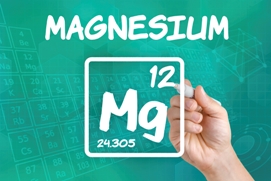Magnesium Deficiency
Magnesium is required by the body for the healthy operation of a number of regulatory and biochemical systems. In fact, nutritionists call it the ‘master mineral’ for its role in over 300 metabolic processes in the body. Yet up to 80 percent of Americans suffer from magnesium deficiency. It is either these people are not getting enough of this important nutrient from their diets or they have a problem absorbing what they eat. It is, therefore, no wonder that the rates of stroke, heart disease, osteoporosis, arthritis, chronic fatigue, stress-related illnesses, and digestive disorders are on the rise.

What is the cause of magnesium deficiency?
There are many reasons why people suffer from magnesium deficiency. Top among these is inadequate intake of dietary magnesium and the inability of the body to absorb the little that gets into the body. The following are some of the causes of magnesium deficiency:• Poor Diets. There are a number of well-known magnesium-rich foods on the market but which people overlook. They include oat bran, spinach, brown rice, Swiss chard, lima beans, and almonds. But rarely do people include these foods in their diet. Today’s diets consist of refined grains, meat, dairy products, and processed foods. You would find much magnesium, if any, in these foods.
• Caffeinated Beverages. Did you know that soda has phosphates which attach themselves to the magnesium in your body rendering it impossible to absorb? Also, drinking coffee or alcohol can cause the kidneys to excrete excess magnesium and other key minerals. That’s why most of the heavy coffee drinkers suffer from serious magnesium deficiency.
• Soft Water. Most of the tap water supplied in major cities has been softened to remove most of its mineral content. You, therefore, cannot be sure if you are getting any magnesium from drinking water. Clearly, drinking soft water is a major cause of magnesium deficiency.
• Calcium Supplements. Did you know that some of the dietary supplements you take can inhibit the absorption of magnesium? If you are taking calcium supplements for the treatment of osteoporosis, that could be the reason for your magnesium deficiency.
• Chronic Stress. Individuals who are chronically stressed have been found to show signs of magnesium deficiency. In the same breath, people with high magnesium levels are known to be less stressed. Stress produces high adrenaline which leads to increased loss of magnesium from the body.
Impact of magnesium deficiency
Magnesium is required in the human body for muscle and nerve function, protein synthesis, blood pressure regulation, and blood glucose control. The role of this mineral in the body is very key to the very existence of human beings. That is why magnesium deficiency is not taken lightly. It causes the following:• Artery Calcification. People suffering from magnesium deficiency are prone to the calcification of arteries, which can lead to heart disease and heart attack.
• Muscle Cramps and Spasms. Due to calcification, the arteries usually stiffen leading to muscle cramps and spasms.
• Anxiety and Depression. Magnesium deficiency has been found to have a profound impact on mental health. Where this persists for long periods, some neurons end up dead.
• High Blood Pressure. Results from scientific studies have shown that high magnesium intake has the healthiest blood pressure numbers. In fact, magnesium supplementation has been shown to significantly reduce high blood pressure.
• Hormone Problems. There is a positive correlation between a spike in certain hormones and magnesium deficiency. Take estrogen and progesterone, two hormones in pregnant women. Did you know that pregnant women experience increased leg cramps, a symptom of magnesium deficiency?
• Sleeping Problems. Magnesium deficiency can cause sleep problems even in, otherwise, healthy individuals. In fact, magnesium helps relax the mind and body leading to healthy sleep.
• Lethargy. For the cells to create ATP energy, they need magnesium. ATP, being the main source of energy in body cells, must bond with a magnesium ion to be active. Magnesium deficiency, therefore, leads to lack of energy, at least at the cellular level.
• Bone Health. Although calcium is the most important mineral for bone health, it cannot function properly without magnesium. This mineral is required for Vitamin D to help in the absorption of calcium. Magnesium also stimulates the hormone calcitonin which helps draw calcium out of the soft tissues and muscles into the bones.
How to overcome magnesium deficiency
Although there are many ways to deal with magnesium deficiency, the healthiest is eating healthy. Key foods include legumes, spinach, nuts, seeds, and whole grains. In fact, any food with dietary fiber is a source of magnesium. You can easily solve magnesium deficiency by eating healthy. supplements in the form of magnesium oxide, chloride, and nitrate can also help. Medications such as laxatives are also good sources of magnesium. You will also find it in antacids and medicines for heartburn.It is always important to remember that there is no real reason why you should suffer from magnesium deficiency when you can easily get it from food (and supplements if appropriate) .
